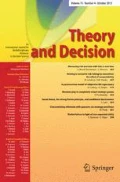Abstract
Positionalist voting functions are those social choice functions where the positions of the alternatives in the voter's preference orders crucially influence the social ordering of the alternatives. An important subclass consists of those voting functions where numbers are assigned to the alternatives in the preference orders and the social ordering is computed from these numbers. Such voting functions are called representable. Various well-known conditions for voting functions are introduced and it is investigated which representable voting functions satisfy these conditions. It is shown that no representable voting function satisfies the Condorcet criterion. This condition and Arrow's independence condition, which are typical non-positionalist conditions, are shown to be incompatible. The Borda function, which is a well-known positionalist voting function, is studied extensively, conditions uniquely characterizing it are given and some modifications of the function are investigated.
Similar content being viewed by others
Bibliography
Arrow, K. J., Social Choice and Individual Values, 2nd ed., Wiley, New York, 1963.
Black, D., The Theory of Committees and Elections, Cambridge University Press. Cambridge, 1958.
Borda, Jean-Charles de, ‘Mémoire sur les élections au scrutin’, Histoire de l'Académie Royale des Sciences, 1781.
Fishburn, P. C., ‘A Comparative Analysis of Group Decision Methods’, Behavioral Science 16 (1971) 538–544.
Fishburn, P. C., The Theory of Social Choice, Princeton University Press, Princeton, 1973.
Hansson, B., ‘Group Preferences’, Econometrica 37 (1969) 50–54.
Hansson, B., ‘The Independence Condition in the Theory of Social Choice’, Theory and Decision, pp. 25–49 this issue.
Sen, A. K., Collective Choice and Social Welfare, Holden-Day, San Francisco, 1970.
Author information
Authors and Affiliations
Additional information
My thanks are due to professor Bengt Hansson for encouragement and several helpful suggestions.
Rights and permissions
About this article
Cite this article
Gärdenfors, P. Positionalist voting functions. Theor Decis 4, 1–24 (1973). https://doi.org/10.1007/BF00133396
Issue Date:
DOI: https://doi.org/10.1007/BF00133396


